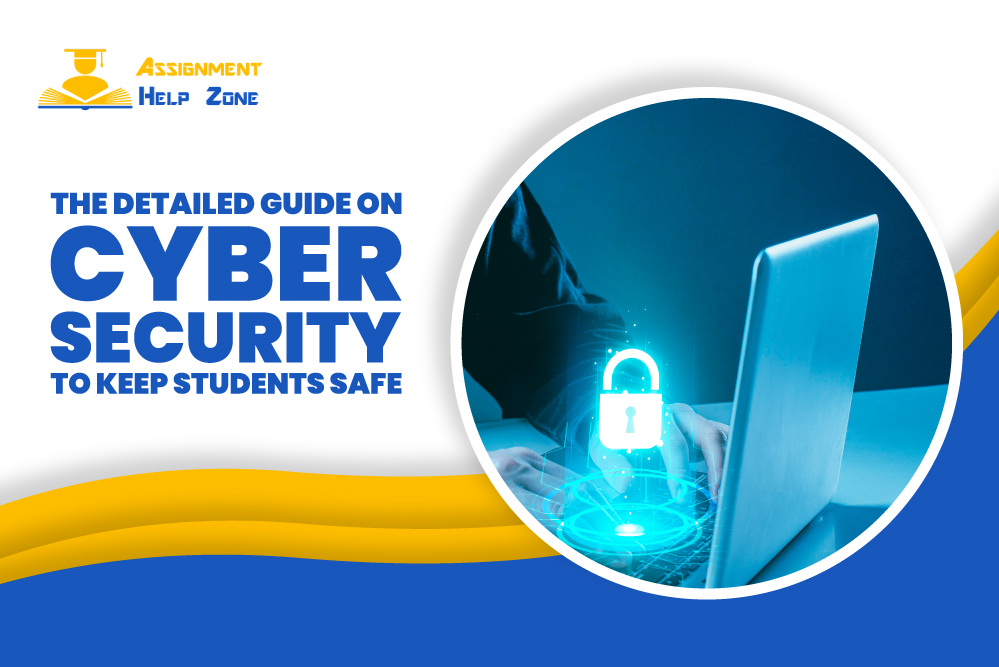Cyber security laws are in place to keep students safe. These cyber security laws are also applicable to the public as well as private educational institutions. In this article, we will talk about everything related to cyber security. Also, to advance students’ ease, our team caters to finance assignment help online requests.
So, without any further ado, let’s get going.
What Is Cyber Security? A Thorough Explanation.
Cyber security is the act of protecting digital assets and systems from threats. It’s important to understand that cyber security is not just about your personal computers. But it also extends to your smartphones, network devices, IoT devices and other connected systems.
The term “cyber” refers to technology in the form of software or hardware that can transmit data over a network. This can be done via the internet or through insecure channels such as Bluetooth or WiFi connections.
A cyber attack happens when a hacker attempts to gain access to any system. One that contains sensitive information by exploiting vulnerabilities in its design, configuration or operation. For example, if you have an email account on Gmail and use it for business purposes then anyone who has access to your account could target your business data. Whether this is intentional or not.
There are a lot of different aspects of cyber security, but the basics are these three things:
- Protect yourself from malware (such as viruses and worms) by installing updates on all of your devices regularly and regularly backing up important data.
- Protect yourself against hacking attempts by using strong passwords for all websites and services that require them.
- Protecting yourself against physical theft or damage by keeping your software up-to-date, using anti-virus software, using backups for important files, etc.
Data Privacy Act
The Data Privacy Act was introduced in 2010 and it protects the personal data of citizens. It prohibits unauthorized access to personal data, with the exception of legitimate purposes such as education or employment.
The Act also requires that companies collect and store user information securely, maintain accurate records and report any breaches of security within 48 hours.
Unauthorized Access To The Government Website
If you access a website, including but not limited to departmental websites, in the course of your employment, you become an employee. This means that if you are caught accessing any kind of government website without authorization and/or without permission from your employer, it is considered a misuse of an official position by an employee.
The penalty for unauthorized access to government websites will depend on how much damage was done by this act.
Hacking Or Cracking Of Computer System
This is the act of accessing another person’s computer without their permission and using it to one’s own advantage. It can be done by hacking into a computer system, or by getting access to someone else’s password and using it to get into the system. Penalties for hacking or cracking include imprisonment of up to five years, fines ranging from Rs 10 lakhs (US$1 million) to Rs 5 crore (US$50 million), as well as suspension or cancellation of passports in some cases.
To report such an offense, contact your local police station immediately after discovering that your personal data has been stolen. They will help you file a complaint with them if necessary.* How do I prevent myself from becoming a victim?* You should always keep your passwords secure when logging in via computers or other devices such as smartphones; never share them with anyone else! If possible avoid using the same password on multiple accounts altogether because this makes it easier for hackers who want access to one account but not another one due its the similarity between them; try changing passwords regularly so that even if someone manages somehow to get hold of yours then they won’t know what does match theirs anymore!
Illegal Use Of Passwords
The use of passwords to control access to information and systems is illegal. The penalty for such use depends on the extent and nature of your actions and whether or not you were found out by someone else (e.g., a disgruntled employee). If you are caught, it’s best that you make sure that your password policy is correct from the beginning so as not to commit fraud; otherwise, you could face serious consequences like jail time or fines up to $250k per violation depending on what law enforcement agency catches you under.
To avoid using someone else’s password:
- Use unique passwords for each account – this will help prevent hackers from gaining access by using a single password across multiple sites/accounts
- Ensure that all employees understand how important it is not only “to keep them safe” but also “not give up any personal information”.
Unauthorized Use Of Devices
The unauthorized use of devices or accessories to gain access to computers, networks, and internet communications is also a crime.
A student who uses an unauthorized device (e.g., phone) or accessory to gain access to a computer or network is committing a crime punishable by law. This includes:
- Using social media accounts without authorization from the account owner (e.g., “phishing”)
- Using someone else’s password without permission (i.e., “hacking”)
Electronic Fraud.
Electronic fraud is the use of computers and other electronic devices to steal money or information. It’s a crime, and it’s something that you should be aware of if you want to stay safe online.
Electronic fraud has become an increasingly common problem as technology continues to advance at an alarming rate. For example, phishing sites are designed specifically for one purpose: stealing your identity using someone else’s personal information (like social security number). Identity theft isn’t just about stealing an email address or password; it can also mean someone taking control over your bank account without your knowledge!
In A Nutshell
It is a big topic, and it’s important to understand what it means. Cyber security laws are to protect students and help them feel safe on campus. They also help prevent attacks against schools and colleges by making sure students are aware of what they can do in order to stay safe online.
Here are some of the most important things you need to know about cyber security:
- You should never open an email from someone you don’t know or trust, even if it looks like it came from your friend or teacher at school. If someone sends an email from their account asking for money or personal information, delete the message immediately without opening any attachments! This will keep your computer secure. While also keeping potential attackers out of your inbox until the authorities catch them.
- Always use strong passwords when logging onto any website; these are a part of ID verification procedures so that only authorized users may access certain parts of websites such as social media accounts where millions share personal information daily.”
The Right Way To Take Advantage Of Cyber Security
Cyber security is a serious topic. And it’s important to take precautions to protect yourself from the risks of cyber attacks.
But what does that mean?
It means that you need to be aware of your surroundings, especially when you’re online. You should use common sense—if something seems off, it probably is. And if you do find something suspicious, you should report it right away.
You should also be careful about what information you share online. Don’t post personal information like your social security number or bank account numbers; they’re too easy to steal and use as passwords! And don’t post passwords for other people’s accounts either—that’s just asking for trouble! Finally, make sure your computer is up-to-date with all of its security patches. So that if an intruder tries to get in through a vulnerability in the operating system or other software, they won’t have access to anything valuable on your computer.
Here are some more ways to keep yourself safe online:
- Do not open suspicious emails or attachments.
- Do not click on links in email messages from unknown senders, even if they look legitimate.
- Use a VPN when you’re online. And browse the web from different locations to avoid tracking or hacking activities by hackers. They may be watching your location and searching for vulnerable targets such as yours.
- Install antivirus software on your computer to keep it protected at all times.
- Make sure that your passwords are strong and unique, and don’t use the same password for multiple accounts or devices.
- Set up two-factor authentication on all of your accounts that support it. Especially if they’re online-only accounts like email or social media platforms like Facebook or Instagram!
Conclusion
Cyber security laws are in place to keep students safe. The government has taken the initiative to make sure that the children of our nation are not in any kind of danger from the internet world. With these cyber security laws, it becomes easy for everyone to access these resources safely and use them effectively so that there is no hassle while teaching or learning new things


